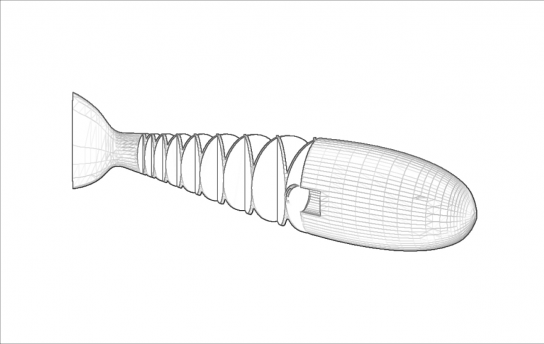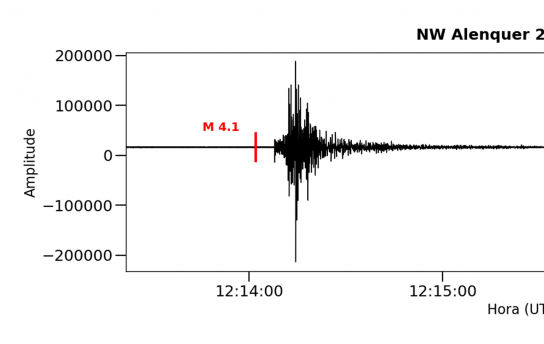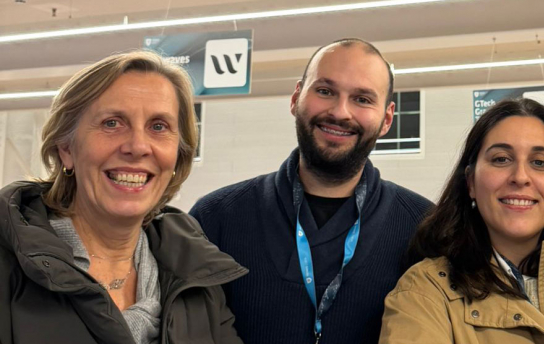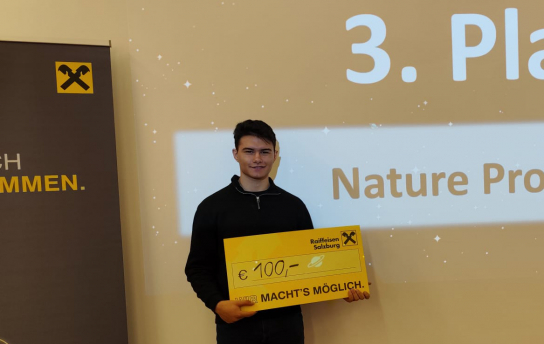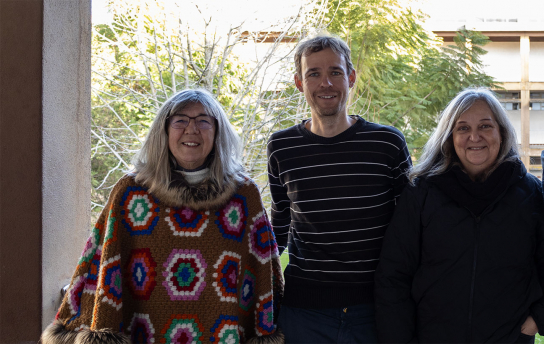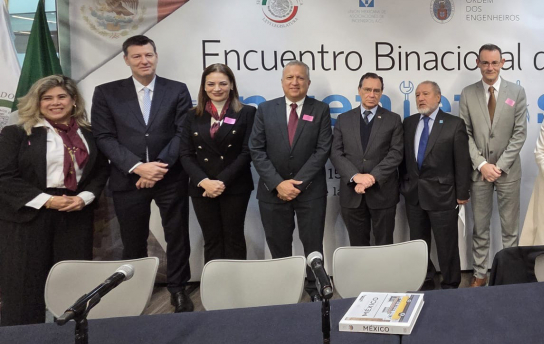ISEL has recently registered, with the National Institute of Industrial Property (INPI), the design of a robot‑fish prototype developed by student Mário Nunes as part of his Master’s Final Project in Mechanical Engineering (MEM). The industrial property registration establishes a solid foundation for the future development of innovative solutions, promoting a better response to engineering challenges.The constructed prototype stands out for its use of FDM 3D‑printing techniques, enabling a single‑piece structure and self‑assembly, with a tail of complex geometry. This bio‑inspired design, manufactured in thermoplastic polyurethane (TPU), uses an optimized lattice mesh to provide lateral flexibility—essential for simulating natural swimming and reducing energy consumption during underwater locomotion.The multidisciplinary project was supervised by faculty members Mário Mendes (DEM/ISEL) and Tiago Charters (DM/ISEL). Prototype testing was carried out at the ISEL Digital Workshop, at the Industrial Automation Laboratory of DEM/ISEL, and at the Construction Materials Laboratory of Civil Engineering at DEC/ISEL.
The R6379 seismic station installed on the ISEL campus by the geophysics group of the IDL@ISEL hub once again demonstrated yesterday its importance for monitoring local and regional seismicity. In the early afternoon of February 19, 2026, the station clearly recorded the two earthquakes that occurred in the Alenquer area.Due to their temporal and spatial proximity and their nearly identical characteristics, these two events can be considered doublet earthquakes, a term used when two earthquakes have very similar magnitudes, virtually coincident epicentres, almost identical waveforms, and occur in sequence, reflecting a common origin and a very similar rupture process. Relative amplitudes are shown on the y‑axis. The red lines mark the event times (12:14:02 for the 1st and 12:16:04 for the 2nd), as computed by the Portuguese Institute for Sea and Atmosphere (IPMA).The seismic signals were clearly recorded on the three components of the seismometer—vertical, north–south, and east–west—allowing precise identification of the arrival of P and S waves. The sensitivity of the short‑period sensor makes this station particularly effective for recording local or regional earthquakes. Integrated into the global network Raspberry Shake, which brings together thousands of sensors worldwide, this station enhances seismic monitoring capacity in the Lisbon region and complements the existing network. The recorded data are openly accessible, an approach aligned with the open‑science principles and societal engagement that guide the IDL@ISEL hub. You can consult the station’s earthquake records here.With this new recording, the station once again establishes itself as a scientific, educational, and civic tool, enabling students, researchers, and the public to follow the region’s seismic activity in real time.More information about these events is available on the IPMA website in the shakemaps information at this link, and on the EMSC website (1st Earthquake and 2nd Earthquake).You can view the earthquake records from the ISEL station here.
An innovative project with ISEL DNA is gaining prominence within the national innovation ecosystem. Ricardo Ferreira, an ISEL alumnus (Bachelor’s and Master’s in Chemical and Biological Engineering), is the CEO and Co-founder of Ripenew, a recently created technology start-up with a mission to combat post‑harvest waste in the fruit and vegetable value chain.Ripenew emerges from the direct transfer of scientific knowledge to the market, bringing together researchers and lecturers from various Higher Education institutions. The founding team includes two ISEL lecturers, João Miguel Silva (DEQ/ISEL) and Isabel João (DEQ/ISEL), reinforcing the School’s active role in promoting innovation with real societal impact.Sustainable technology serving the agri-food sectorThe start-up is developing a compact, reusable solution that removes ethylene, the natural hormone responsible for accelerating the ripening of fresh produce. By reducing the concentration of this gas during storage and transport, Ripenew’s technology extends shelf life, preserves quality, and significantly reduces waste, all without the use of chemicals — a clear response to one of the major sustainability challenges faced by the agri-food sector.From ISEL to the entrepreneurial ecosystemRicardo Ferreira’s journey illustrates the impact of ISEL in shaping professionals capable of transforming technical and scientific knowledge into sustainable business solutions. The creation of Ripenew also involves researchers from IST and CEGIST, as well as a patent submitted in October, co‑authored by the University of Lisbon, ISEL, and the University of Algarve, highlighting the collaborative nature of the project.Ripenew has already taken the stage at major innovation events such as the Web Summit and was recently represented at the Técnico Innovation Summit 2026, held on February 3, 2026, where the image illustrating this news piece was captured.Innovation with impactRipenew stands as a concrete example of how education at ISEL, combined with research and interinstitutional collaboration, can give rise to sustainable technology start-ups with the potential to transform food supply chains and contribute to a more efficient and responsible future.ISEL is proud to see its alumni and lecturers at the forefront of innovation, carrying the School’s knowledge further — from academia to the real world.
Miguel Alves, a student in the Bachelor's Degree in Computer Science and Computer Engineering, won 3rd place in the international ideaUP! 2025 competition, promoted by FH Salzburg – University of Applied Sciences in Austria, where he is currently studying as an outgoing Erasmus+ participant.He competed with the project Nature Protector, a startup he founded, facing dozens of applications from students, researchers, and entrepreneurs from various higher education institutions and Austria’s innovation ecosystem.Nature Protector proposes an integrated system for the prevention, detection, and response to forest fires, combining technology, data analysis, and coordination between entities, with the aim of protecting forests and rural areas, reducing environmental damage, and mitigating CO₂ emissions. The jury highlighted the strong social and environmental impact of the solution, as well as its implementation potential.The ideaUP! 2025 competition received 38 project submissions, evaluated by a specialized jury according to criteria such as degree of innovation, user benefit, differentiation, and economic viability. Achieving 3rd place represents significant recognition of the quality of the work developed by the ISEL student in a highly competitive international context.
PT‑AQUASEIS is ISEL’s most recent scientific research project, led by Professor Graça Silveira (DF/ISEL). The initiative aims to introduce, for the first time in Portugal, the use of seismic ambient noise interferometry (SANI) as a tool for the continuous monitoring of aquifers in the south of the country.The project uses a network of more than 30 seismic stations, combining permanent and temporary stations, to quantify variations in subsurface physical properties induced by fluctuations in aquifer recharge and discharge. Results will be validated in the Querença‑Silves Aquifer, in the Algarve—one of the best‑characterized ground water systems in Portugal—through the joint analysis of seismic, piezometric, InSAR, GPS, and geoelectrical data.PT‑AQUASEIS is funded by the Foundation for Science and Technology (FCT) and developed by a multidisciplinary national and international team, with expertise in Physics, Seismology, Hydrogeology, Geophysics, and Geodesy. The IDL@ISEL team includes Graça Silveira (principal investigator), Alexandra Afilhado, David Schlaphorst, Joana Ribeiro, and Nuno Dias, and the project is associated with the Dom Luiz Institute research unit (UID).Project partner institutions include the University of the Algarve and FCiências.ID – Association for Research and Development of Sciences. Meeting the challenges of water scarcityPortugal faces a scenario of increasing water scarcity, particularly in the southern. Traditional methods of aquifer monitoring, although precise, involve high costs and have limitations in their temporal and spatial resolution.SANI thus emerges as a cost‑effective, continuous method with high temporal resolution, enabling detailed study of aquifer dynamics at the regional scale. This innovative approach opens the door to more sustainable water resource management and a also contributing to a better response to climate challenges.How does ambient noise interferometry work?Like seismic waves generated by earthquakes, waves produced by ambient noise sources propagate through the subsurface at velocities that depend directly on the physical characteristics of rocks—including density, elasticity, and porosity—and on their degree of saturation by fluids.Thus, significant fluctuations in the amount of stored groundwater cause perturbations in the stress state and in the pore filling of the geological materials that constitute aquifers, which are reflected in changes in the propagation velocity of seismic waves in the subsurface. Therefore, relative variations in propagation velocity can be used as a proxy to assess changes in the amount of water available in aquifers.This method makes it possible to evaluate transient processes such as recharge, depletion, or instability associated with overexploitation of the aquifer, seasonal fluctuations, or extreme events.Impact and disseminationProject results will be disseminated in international scientific journals, conferences, and workshops. The work will also involve students and early‑career researchers, amplifying academic impact.Beyond the scientific community, results will be shared with governmental and regional entities, including the Portuguese Institute for Sea and Atmosphere (IPMA), the Portuguese Environment Agency (APA), and municipal authorities, ensuring that the knowledge generated contributes directly to a better knowledge of water resources.PT‑AQUASEIS also includes outreach activities for society, notably through the Seismology‑at‑Schools initiative, bringing younger audiences closer to science and environmental monitoring.
Between January 12 and 16, 2025, the President of ISEL, Professor José Nascimento, took part in the Mexico–Portugal Binational Engineering Meeting, held in the Senate of the Republic of Mexico, an initiative of the Unión Mexicana de Asociaciones de Ingenieros, A.C., in partnership with the Ordem dos Engenheiros of Portugal.ISEL’s participation resulted from an invitation by the Ordem dos Engenheiros, within the scope of representing Portuguese higher education in engineering, with the objective of bringing academia closer to the business sector and highlighting best practices in engineering training, establishing ISEL as a reference institution in this field.The President of ISEL took part in several discussion panels dedicated to engineering education, the engineering profession, and the international mobility of professionals, contributing to the reflection on education, qualification recognition, and cooperation between academic institutions, professional orders, and governmental entities from Portugal and Mexico.The program also included a visit to the facilities of Mota-Engil, a Portuguese company of international renown in the construction sector, currently responsible for part of the construction of the light-rail metro system in the city of Monterrey.

